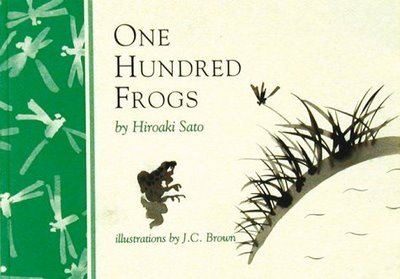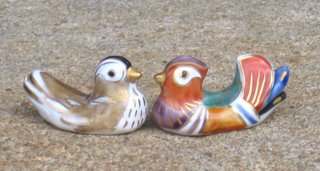[ . BACK to Haiku Theory TOP . ]
:::::::::::::::::::::::::::::::::::::::::::::::::::::::::::::::::::::::::::::::::::::::::::::::::::::
 Translating Haiku
Translating Haiku
Memos of the Yahoo Forum, founded in April 2006
My experience in the translation business goes back more than 40 years, working as a medical doctor/translator in research programs for the WHO, University of Heidelberg.
Later I studied Far Eastern Art and began to translate
texts about Japanese Buddhist Art.
I am born German and live in Japan since 1977. I work as professional translator for scientific and HiTech texts and do cultural translations for my pleasure.
I do not consider myself a poet and translating haiku is rather new to me. Since neither Japanese nor English is my mother tongue, it is indeed quite difficult for me to find the right words.
I will nevertheless try to assist as best as I can to help you understand Japanese Haiku. Apart from the pure language problems, there is a lot about the culture that you might not know and I can provide "footnotes" for this kind of missing knowledge, I hope.
Gabi Greve, GokuRakuAn, Japan, 2004
Languages: German, English, Japanese (a bit of French and Latin)
. Japanese Haiku - Translations .
Join me on Facebook, since October 2012
:::::::::::::::::::::::::::::::::::::::::::::::::::::::::::::::::::::::::::::::::::::::::::::::::::::::
In the translation forum
let us just try to understand the original and present it to the readers who do not speak Japanese (or any other original language for that matter) as best as we can, to give all a chance to understand it better, in its original form and contents.
Considering the old haiku of Japan, we even have to make a time-slip to their use of the language and the culture at that time.
Studying a haiku at the forum includes literal translations and then other versions that might be possible.
Some might read better as poems, others not.
In that way we can show how a short Japanese poem is indeed not so easily transformed into another language.
As I mentioned, we also need cultural background information.
Knowing a haiku is about Manpuku-Ji we need to explain a bit about this important temple and its atmosphere.
"Autumn festival" is a simple translation of AKIMATSURI, but it will not tell you what really happens then and how the Japanese associate and feel about it. So you need more cultural background.
I admire Robin Gill for giving his thoughts and versions while translating a haiku.
In studying a translation by someone else, let us see what other kinds of versions we can come up with. Not as a competition for "Best Version", but for bringing out the broadest meaning of a haiku to more of the haiku friends who do not read Japanese and who are here to study.
Translating Haiku Forum, March 2007
Some haiku are rather wonderful in Japanese but plain and simple in the English translation. Many friends keep asking:
What am I missing ?
:::::::::::::::::::::::::::::::::::::::::::::::::::::::::::::::::::::::::::::::::::::::::::::::::::::
Did you know,
you can polish your Japanese,
but not japanese your Polish ?!
I was told so many years ago by a Polish Jesuit priest at the Japanese Language Center in Kamakura.
Many of you are tempted to write their own haiku in Japanese!
I can understand the feeling, but please, take my advise.
First learn the normal Japanese language as it is spoken in Japan (many books teach you "literal" Japanese, which no one speaks).
Once you consider yourself fluent in normal Japanese conversation, start reading about haiku and get your big Japanese saijiki. Learn the vocabulary needed there, get some knowledge abuot the grammar used in haiku. There are plenty of cheap books in Japan.
And then, try to find a Japanese teacher who will kick your shin if you make a mistake.
Do not go for the "backpatting" pet gaijin approach, that will not help you improve your language skills.
When someone tells you "お上手ですねええ” you should know it is time to run, fast ...
And please, please, please,
do NOT use Babbelfish or other online translation services.
They may be useful for normal text, but never for poetry !
Writing your own haiku in Japanese only works if you are serious to invest about 5 years of intensive language learning (best spent in Japan) and then the rest of your life for improvements.
So better not start at all and spend your time more efficiently to improve your skills for writing good haiku in English (or whatever your mothertongue is).
:::::::::::::::::::::::::::::::::::::::::::::::::::::::::::::::::::::::::::::::::::::::::::::::::::::
Cross-cultural Musings
When translating, it is not only about words, but of a cultural understanding that might not (and usually does not) exist in the target language.
I will always remember the first missionaries looking at what we now call "Buddha Statues". They only saw hineous fiendish demonic fetishes (Götzenbilder in German) and translated the literature accordingly.
When I started writing about "Buddha Statues" in German, more than 30 years ago, I had to sort of make up my own vocabulary to convey what these things mean here in Japan in their original context and in the daily life of the Japanese.
Consider a statue of a Kannon with 1000 arms and a poor missionary 200 years ago trying to cope with such a monster in his Christian vocabulary ...
What I am trying to say is this
Usually you look into things from the standpoint of your own culture, trying to understand it on YOUR terms, using words of YOUR language.
I try to understand things Japansese on THEIR terms, the Japanese way. This means re-programming the old brain, loosing the European cultural clutter and start from ZERO ... Ichi Ni San ...
Gabi Greve
:::::::::::::::::::::::::::::::::::::::::::::::::::::::::::::::::::::::::::::::::::::::::::::::::::::
Musings by Chibi, November 2008
I am beginning to believe... truly believe, that haiku can only be written in Japanese because it is intrinsically Japaense. I look at it this way. If you are to construct a sake cup made from Japanese wood, of Japanese design, in a Japanese setting filled with sake made in Japan... then how can you do so in another wood, design, setting or drink? By definition, you just can not.
MORE by Chibi
Translating Haiku Forum
:::::::::::::::::::::::::::::::::::::::::::::::::::::::::::::::::::::::::::::::::::::::::::::::::::::
Translating Place names
Placenames
I think place names should be used as they are in the original language. If necessary, an explanation about the meaning of the name can be given in a footnote.
Arakawa 荒川
river Arakawa
Arakawa is the full name of the river. Putting the denominator "river" in front of the name will tell a person who does not know any Japanese:
This is a river called Arakawa.
(To not translate: river Ara, or even worse, river Wild.
法隆寺 temple Horyu-Ji, this is a temple called Horyu-Ji
東京, this is
Tokyo, meaning the "Eastern Capital".
不二, this is Mount Fuji, in the old writing of Issa, Meaning Mount "Not Two".
Here is a haiku with a play on words on the "stone mountain".
Ishiyama no ishi ni tabashiru arare kana
splashing on the stones
of Mount Ishiyama -
these hailstones
Matsuo Basho, Tr. Gabi Greve
Read the full discussion HERE !
...
ishiyama no ishi yori shiroshi aki no kaze
autumn wind
whiter than the white cliffs
of this mountain
Tr. Gabi Greve
................... Comment by Larry Bole:
When a Japanese person hears "Ishiyama," do they just hear a name, or do they hear the underlying meaning of that name? I am tempted to suggest they just hear a name, in the same way that English people most likely just hear "Cambridge," and "Oxford," without thinking "Cam-bridge" (a place where there was a bridge over the River Cam), and "Ox-ford," (a place where oxen could ford a river).
So if "Ishiyama" is used in a translation 'as is', I would think it should be footnoted as to its meaning. And if one decides to do that, why not just use the name's meaning in the haiku, and make "Ishiyama" a footnote to that?
I'm also curious about Mt. Asama.
Does "Asama" mean something in Japanese?
Read more of the thoughts on this by
Larry Bole
... ... ...
Haiku has those two elements,i.e Kanji and hiragana, image and music.
Asama 浅間 is old style Japanese that comes from Ainu.
It sounds softly, romantic, analog and emotional.
Sengen is Kanji itself that is image, reasonable, digital and theoretical.
Read the thoughs of Nakamura Sakuo
... ... ... ... ... ...
Famous Places, best with a word of information.
The Hepburn Romaji spelling and the spelling used more or less oficcially now can be different. I usually try to reflect both.
東大寺, Toodaiji, Temple Toodai-Ji
利根川, Tonegawa, River Tonegawa
大和田湖, Toowadako, Lake Towada
松尾芭蕉 Matsuo Basho, Mister Pine-Tale Bananas
Pseudonym for Matsuo Kinsaku 金作,
Matsuo Chu'emon Munefusa 松尾忠右衛門宗房
WKD: PLACE NAMES of Japan
WKD: PLACE NAMES of the WORLD
:::::::::::::::::::::::::::::::::::::::::::::::::::::::::::::::::::::::::::::::::::::::::::::::::::::
General problems concerning our haiku translations will be collected here, as they come up.
Spelling Japanese : Please use the Hepburn System.
The Basics of Japanese Haiku Theory - A Long List
Gabi Greve
WKD: Haiku .. Japanese Words in Cultural Context
Reading and Translating the Japanese Haiku Masters
Tips about translating ... Jane Reichhold
Simply Haiku Summer 2008, Basho
WKD: Direct translation versus meaningful translation
chokuyaku versus iyaku
Translating the Poetry of Miyazawa Kenji
:::::::::::::::::::::::::::::::::::::::::::::::::::::::::::::::::::::::::::::::::::::::::::::::::::::
Online Dictionaries, Synonym Dictionaries and more
Tools of the Trade, check our various LINKS here.
Add your favorite language tool LINKS.
:::::::::::::::::::::::::::::::::::::::::::::::::::::::::::::::::::::::::::::::::::::::::::::::::::::
Some theory about translating Japanese haiku
Basho’s Haiku: Selected Poems of Matsuo Basho
David Landis Barnhill
In the introduction, Barnhill mentions some of the problems involved in translating haiku.
http://www.modernhaiku.org/bookreviews/Barnhill'sBasho2005.html
Rise, Ye Sea Slugs!
Robin Gill
The way Gill translates is not only marvelous, it is absolutely revolutionary.
Instead of giving the reader the idea that there is only one way to translate a haiku, he offers a word-for-word translation and then goes into great detail explaining the ambiguities of the Japanese language along with the secrets of Japanese behavior. His final translation is often a series of possible ways of putting the haiku into English. . . .
He is even secure enough to admit when he really cannot figure out what the author was trying to say. . . .
http://www.paraverse.org/flyreview.htm
SHIKI : debate on translating haiku, 1999
Susumu Takiguchi
http://haiku.cc.ehime-u.ac.jp/shiki.archive/9912/1063.html
Can the Spirit of Haiku be Translated ?
Susumu Takiguchi
http://www.worldhaikureview.org/2-1/whcessay_translatedst.shtml
What can I say on translating haiku?
Eiko Yachimoto
http://www.poetrylives.com/SimplyHaiku/SHv1n4/Yachimoto.html
Translation discourse on a haiku by Issa
Darko Suvin
... PDF file achive.vanderbilt.edu/
Obscurity is not something to be emulated, and we should be careful to avoid it in modern hokku.
The issue of translation arises, however, whenever one reads an old hokku put into English. The average reader does not know, first of all, if the original was clear or vague, or whether the English translation simply transfers the meaning from language to language, or if the translator has added considerably from his or her own imagination.
David : ODDITIES OF TRANSLATION / Hokku
. . . . . and more
... reading a word-for-word translation does not mean one is getting the same effect as reading it in the original language.
source : David, Hokku Inn
.................................................................................
Professor Yuasa Nobuyuki:
It looks as if
Iris flowers had bloomed
On my feet --
Sandals laced in blue.
Matsuo Basho
"the language of haiku ... is based on colloquialism, and in my opinion, the closest approximation of natural conversational rhythm can be achieved in English by a four-line stanza rather than a constrained theree-line stanza.... "
.
"this translation is primarily intended for lovers of poetry, and only secondarily for scholars whose minds should be broad enough to recognise the use in a translation like this. It's not for those purists who insist (without believing either in its validity or possibility, I presume) that haiku should be translated with the original seventeen syllable scheme or at least into three lines."
source : The narrow road to the Deep North
:::::::::::::::::::::::::::::::::::::::::::::::::::::::::::::::::::::::::::::::::::::::::::::::::::::
Translating Personsl Pronouns
Personal pronouns are often implied in the Japanese language, but should be translated in other languages when things are not quite clear.
my love for you
(anyone's anonymous) love for you
are two different meanings.
It usually does not add additional depth to a poem, but a bit of confusion which is better avoided.
. aimai 曖昧 ambiguous, unclear or vague .
a bad translation or
. . . . Haiku Riddles . . . .
:::::::::::::::::::::::::::::::::::::::::::::::::::::::::::::::::::::::::::::::::::::::::::::::::::::
As a translator, sometimes you have to make up words as you begin to understand things deeper. Or experiment with spellings to convey the meaning of the CUT, kireji etc.
In January 2007, I came across a kind of re-export for the word
haiku in English in a Japanese text from the haiku town Matsuyama in Ehime/Japan:
eigo HA.I.KU 英語ハイク
The katakana spelling of ハイク (in my re-translation: HA.I.KU) indicates this is a foreign word not common in traditional Japanese language.
There is now even a book introducing English language haiku to the Japanese reader:
HAIKUのすすめ―
日本人のための英語ハイク入門
吉村 侑久代
 © amazon.com
© amazon.com
another book on the subject
俳句とハイクの世界
(The world of haiku and HA . I . KU
星野恒彦 / Hoshino Tsunehiko
MANY More LINKS about 俳句 英語 ハイク!!
eisaku ha.i.ku 英作 ハイク
English-language ha.i.ku,
ha.i.ku composed in English (to include the translation of SAKU)
source : www.haiku-hia.com
Haiku International Association
eisaku haiku
sekai haiku 世界俳句 World Haiku
. . . CLICK here for Photos !
Magazine of the World Haiku Association 世界俳句協会
Natsuishi Banya 石番矢
sekai haiku nyuumon 世界俳句入門 A Guide to World Haiku
ISBN-13:9784806046950
Book by 夏石番矢
. . . . .
shinkoo haiku 新興俳句 New and Fresh Haiku
Modern Haiku - gendai haiku 現代俳句
Experimental Haiku
jikkensei haiku 実験性俳句
zenei haiku 前衛俳句
avantgarde Haiku 前衛俳句 zen-ei haiku
vanguard haiku
jiyuuritsu haiku 自由律俳句 free verse haiku
tanshi 短詩 short poem
:::::::::::::::::::::::::::::::::::::::::::::::::::::::::::::::::::::::::::::::::::::::::::::::::::::
Untranslatability
is a property of a text, or of any utterance, in one language, for which no equivalent text or utterance can be found in another language.
Terms are neither exclusively translatable nor exclusively untranslatable; rather, the degree of difficulty of translation depends on their nature, as well as the translator's abilities.
Quite often, a text or utterance that is considered to be "untranslatable" is actually a lacuna, or lexical gap. That is to say that there is no one-to-one equivalence between the word, expression or turn of phrase in the source language and another word, expression or turn of phrase in the target language.
A translator, however, can resort to a number of translation procedures to compensate.
Check it out HERE !
© Untranslatability, from Wikipedia
Add your favorite translation LINKS as a comment here.
... ... ... ... ... ... ... ... ... ...
Poetry is language skating on thin ice.
Translators fish through a hole in the ice.
"The Foreignness of Languages" and Literary Translation
Brother Anthony, An Sonjae (Sogang Univeristy, Seoul)
WKD Library
"Buson and
the Language of Japanese Poetry."
by Makoto Ueda
WKD Library
:::::::::::::::::::::::::::::::::::::::::::::::::::::::::::::::::::::::::::::::::::::::::::::::::::::
My Archives about Haiku Theory and General Subjects
:::::::::::::::::::::::::::::::::::::::::::::::::::::::::::::::::::::::::::::::::::::::::::::::::::::
COMMENTS
The discussion on the "cut" has been very interesting and shows another example of "doing your research". The poem "snicked" into place once I realized the meaning of the folding mat and its uses.
This is what I mean about Japanese HAIKU. I have always found it exciting, frustrating, informing, exhausting, etc...(in short a "joyfull struggle") to attempt the translation on my own especially with tools like google combined with membership in groups like this group.
I feel very blessed to know people with such deep interest in Japanese HAIKU.
Thank you all.
ciao... chibi
.................................................
Thanks. One of the things I enjoy about being in a group like this, is that it gets me to re-reading things I haven't read in a while,and it is an impetus to study haiku. If I could read Japanese fluently, I would follow in Shiki's footsteps, and study, study, study Japanese haiku, both classic and contemporary.
Such study couldn't help but improve one's own haiku (if one can get beyond "the anxiety of influence," to use the critic Harold Bloom's phrase).
Larry
Back to the Discussion Forum !!!!!
:::::::::::::::::::::::::::::::::::::::::::::::::::::::::::::::::::::::::::::::::::::::::::::::::::::
To the Daruma Museum Index
BACK TO
Translating Haiku Forum
[ . BACK to WORLDKIGO . TOP . ]
:::::::::::::::::::::::::::::::::::::::::::::::::::::::::::::::::::::::::::::::::::::::::::::::::::::













